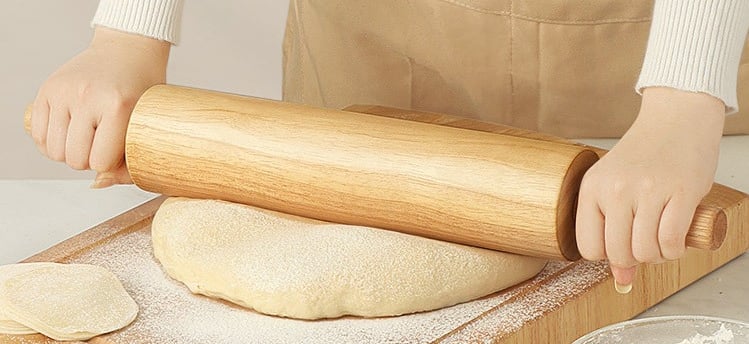We accept wholesale customized service,feel free to contect with us:whatsapp:+8613392817215
Discover the Best Rolling Pins for Perfect Pastry
Discover the best rolling pins for perfect pastry! Explore top options, tips for choosing the right pin, and answers to FAQs. Bake like a pro today!
12/2/20243 min read


When it comes to creating flawless pastries, having the right tools can make all the difference. Among these, a high-quality rolling pin is indispensable. But with so many types available, how do you choose the best one for your baking needs? This guide will help you discover the best rolling pins for perfect pastry, address common questions, and provide valuable insights to enhance your baking experience.
Why the Right Rolling Pin Matters for Pastry Making
Rolling pins play a crucial role in achieving the desired texture and shape for your pastries. Whether you're crafting flaky pie crusts, delicate cookies, or buttery croissants, the type of rolling pin you use can influence the outcome. Here's why:
Even Dough Thickness: The right rolling pin ensures uniform thickness, leading to consistent baking results.
Ease of Use: A well-designed rolling pin minimizes strain and makes the process enjoyable.
Preserves Dough Texture: Certain materials, like marble, help keep dough cool, preventing butter from melting prematurely.
Types of Rolling Pins: Which One Is Best for You?
1. Wooden Rolling Pins
Features: Classic and versatile, available in French and American styles.
Benefits: Excellent for all-purpose use and provides good grip.
Drawbacks: Requires regular maintenance to prevent drying and cracking.
Best For: Everyday bakers looking for a traditional tool.
2. Marble Rolling Pins
Features: Heavy, smooth, and naturally cool.
Benefits: Ideal for working with buttery doughs; stays cool for extended periods.
Drawbacks: Heavier to handle and more expensive.
Best For: Bakers specializing in delicate pastries like puff pastry or laminated dough.
3. Silicone Rolling Pins
Features: Non-stick surface and lightweight design.
Benefits: Perfect for sticky doughs and easy to clean.
Drawbacks: Less control due to its light weight.
Best For: Home bakers who prioritize convenience and ease of cleaning.
4. Stainless Steel Rolling Pins
Features: Durable, sleek, and dishwasher-safe.
Benefits: Lightweight with a smooth, non-porous surface.
Drawbacks: Can feel cold in hand and less traditional.
Best For: Modern kitchens and multi-purpose use.
Frequently Asked Questions About Rolling Pins
1. Which rolling pin is best for beginners?
For beginners, wooden rolling pins are the best choice due to their versatility and ease of control. A French-style pin, which tapers at the ends, offers excellent maneuverability.
2. Can I use a rolling pin for non-pastry tasks?
Yes! Rolling pins are versatile tools. You can use them for tasks like crushing nuts, tenderizing meat, or flattening bread dough.
3. How do I clean a wooden rolling pin?
Avoid submerging wooden rolling pins in water. Instead, wipe them with a damp cloth and dry immediately. Apply food-grade mineral oil periodically to maintain the wood.
Top Rolling Pins for Perfect Pastry
1. J.K. Adams Maple Wood Rolling Pin
Type: Wooden
Features: Classic design, durable construction.
Price: $25-$35
Best For: Beginners and everyday bakers.
2. Fox Run Marble Rolling Pin
Type: Marble
Features: Comes with a wooden stand; excellent for cold doughs.
Price: $30-$50
Best For: Experienced bakers focused on buttery pastries.
3. Joseph Joseph Adjustable Rolling Pin
Type: Wooden with guides
Features: Includes removable discs for precise thickness.
Price: $20-$30
Best For: Bakers who need consistent dough thickness.
4. Wilton Non-Stick Rolling Pin
Type: Silicone
Features: Non-stick coating and lightweight.
Price: $15-$25
Best For: Quick and easy pastry preparation.
Tips for Choosing the Right Rolling Pin
Material Matters: Consider your baking needs and select a material that complements your style (e.g., marble for cool dough, silicone for stickier doughs).
Weight Preference: Heavier pins require less effort but can be harder to handle. Choose based on your comfort level.
Maintenance Requirements: Wooden pins need care, while silicone and stainless steel options are low-maintenance.
Size and Length: Ensure the rolling pin is proportional to your workspace and baking tasks.
Conclusion: Invest in the Best for Perfect Pastry
A quality rolling pin is a baker’s best friend. Whether you opt for the elegance of marble, the simplicity of wood, or the convenience of silicone, the right tool can transform your pastry-making experience. Take time to consider your needs and invest in a rolling pin that matches your baking aspirations. With the right tool in hand, perfect pastries are just a roll away!
Contact us
Email:szchuangqi@gmail.com
Phone:13392817215
Whatsapp:13392817215
Adress:5/F,Xingxiang Building,No5057 Songbai Road,Matian Community,Guangming District,Shenzhen,China.
Earning Disclaimer
My site participates in various affiliate marketing programs,which means that by making purchases through our links to retailer'websites,we get a commission!
